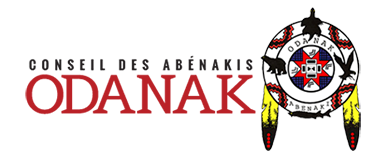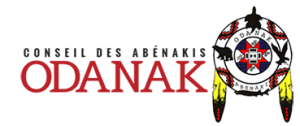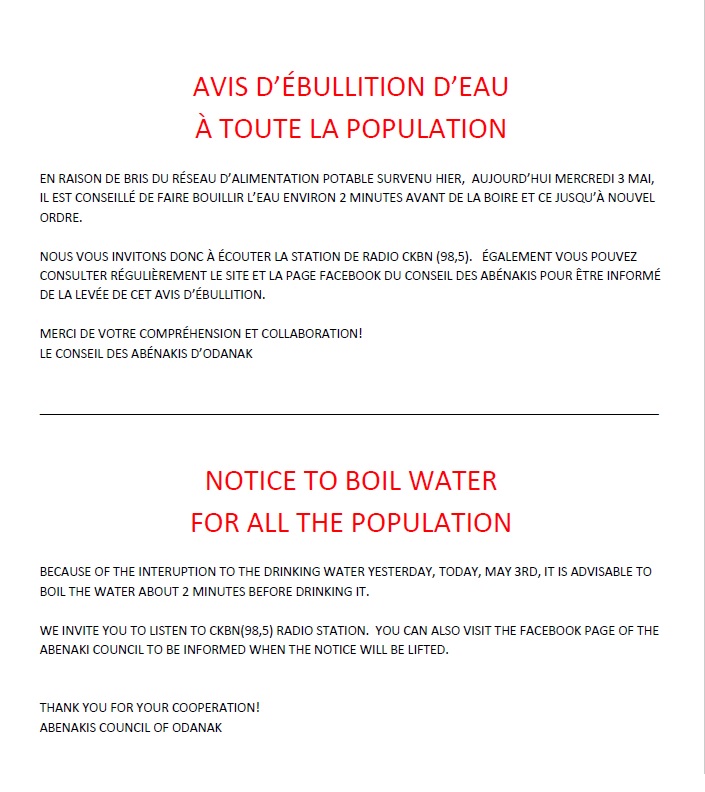June 2017
The Government of Canada Recognizes the National Historic Significance of the Abenaki Migrations to New France (1675-1748)
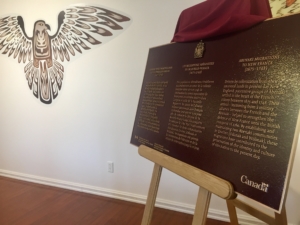 Canada’s national historic sites, national parks and national marine conservation areas enable Canadians to experience their rich and varied history in a special way and play a big part in the celebration of Canada 150.
Canada’s national historic sites, national parks and national marine conservation areas enable Canadians to experience their rich and varied history in a special way and play a big part in the celebration of Canada 150.
Today, Parks Canada and the Historic Sites and Monuments Board of Canada recognized the national historic significance of the Abenaki migrations to New France (1675-1748). A special ceremony took place at the Petite Chapelle Sainte-Thérèse of Wôlinak with members of the Historic Sites and Monuments Board of Canada, the Wôlinak Band Council and the Odanak Band Council.
The Government of Canada is committed to connecting Canadians to the significant people, places, and events that contributed to our country’s diverse heritage. From 1675 to 1748, the Abenaki migrations ensured the survival of those populations who chose to settle in the heart of the French colony after having been evicted from their ancestral lands in New England. The settlements of Saint-François (Odanak) and Bécancour (Wôlinak) thus became places of refuge for hundreds of those people.
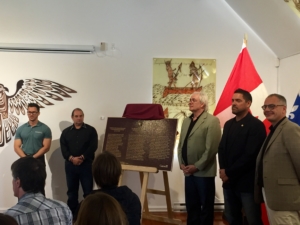
Dave Bernard, Executive Director of the Abenaki of Wôlinak Council; Rick O’Bomsawin, Chief of Odanak; Mario Marchand, historian; Denys Bernard, Excutive Director of the Grand Conseil de la Nation Waban-Aki and Nicholas Roquet, Quebec representative to the Historic Sites and Monuments Board of Canada
Helping the French during numerous incursions, the Abenaki accepted an offer of neutrality by the British following the French defeat in 1760. In doing so, they lost their lands located in New England. By establishing and sustaining two Abenaki communities in Quebec, those migrations helped preserve the Abenaki identity and culture to the present day.
The Government is committed to reconciliation and nation-to-nation relationships with Indigenous Peoples, based on recognition of rights, respect, co-operation, and partnership.
This year, as we celebrate Canada 150, we have an opportunity to bring all Canadians together, create new connections between Indigenous and non-Indigenous Canadians and foster discussions on the stories, cultures, and realities of Indigenous communities.
As part of the centennial of national historic sites, Parks Canada invites Canadians to be inspired and captivated by the stories of the people, places, and events that shaped the Canada of today.
Take advantage of free admission to national historic sites in 2017, and discover truly Canadian places and stories!
Quote
“The Government of Canada is very pleased to commemorate the national historic significance of the Abenaki migrations to New France from 1675 to 1748. Through the Odanak and Wôlinak settlements, the Abenaki culture is still alive and continues to flourish. As part of the 150th anniversary of our great nation, it is important for all of us to learn more about the people, places, and events that have shaped our rich cultural heritage.”
– The Honorable François Philippe Champagne, Minister of International Trade and Member of Parliament for Saint-Maurice—Champlain
Quick Facts
When the Abenaki left their ancestral lands, they originally settled in the vicinity of Lake Champlain, Lake Megantic, Chambly, along the Bécancour, Chaudière and Saint-François rivers, as well as on the shores of the St. Lawrence at Sillery where they could survive by engaging in traditional hunting and fishing.
The arrival of the Abenaki contributed to strengthening the defence of New France until the British conquest in 1760.
Created in 1919, the Historic Sites and Monuments Board of Canada advises the Minister of Environment and Climate Change regarding the national historic significance of places, people, and events that have marked Canada’s history.
JUSTICE MASSE RELIES ON ASSUMPTION THE GOVERNMENT WILL COMPLY WITH THE CONSTITUTION
The Québec Superior Court today dismissed a motion to extend Parliament’s deadline for eliminating sex discrimination from the registration provisions in the Indian Act, however Justice Chantal Masse emphasized that she remains available to hear another motion for an extension before the deadline expires on July 3rd, effectively giving the government and the Senate time to reach agreement on a contentious bill.
Read the complete press release HERE.
MINISTER JODY WILSON-RAYBOULD GIVES UP ON ELIMINATING THE DISCRIMINATION AGAINST FIRST NATIONS WOMEN
Federal Justice Minister Jody Wilson-Raybould no longer wants to fix all sex discrimination in the Indian Act registration rules, even though in 2010, Chief Jody Wilson-Raybould told Parliament “to eradicate discrimination wherever and whenever possible.”
Read the complete press release HERE.
A FIRST ABENAKISE JUDGE
The Abenaki Council of Odanak would like to congratulate Mrs O’Bonsawin on being the first Abenakise Judge.
Previously general counsel with the Royal Ottawa Health Care Group in Ottawa, Mrs O’Bonsawin is appointed a judge of the Superior Court of Justice in Ottawa.
BIOGRAPHY
 Justice Michelle O’Bonsawin was born in Hanmer, Ontario, a small Francophone town east of Sudbury. She is a fluently bilingual Abenaki member of the Odanak First Nation. Justice O’Bonsawin holds a B.A. (Laurentian University), an LL.B. (University of Ottawa), and an LL.M. (Osgoode Hall), and is currently enrolled in the University of Ottawa’s Ph.D. program in law. She began her legal career with the RCMP Legal Services and later was counsel with Canada Post Corporation, specializing in labour, employment, human rights, and privacy law. Prior to her appointment, Justice O’Bonsawin was general counsel for the Royal Ottawa Health Care Group, where she developed a specialization in mental health law. She has taught Indigenous law part-time in the University of Ottawa’s French common law program.
Justice Michelle O’Bonsawin was born in Hanmer, Ontario, a small Francophone town east of Sudbury. She is a fluently bilingual Abenaki member of the Odanak First Nation. Justice O’Bonsawin holds a B.A. (Laurentian University), an LL.B. (University of Ottawa), and an LL.M. (Osgoode Hall), and is currently enrolled in the University of Ottawa’s Ph.D. program in law. She began her legal career with the RCMP Legal Services and later was counsel with Canada Post Corporation, specializing in labour, employment, human rights, and privacy law. Prior to her appointment, Justice O’Bonsawin was general counsel for the Royal Ottawa Health Care Group, where she developed a specialization in mental health law. She has taught Indigenous law part-time in the University of Ottawa’s French common law program.
In addition to her legal work, Justice O’Bonsawin is a frequent guest speaker on mental health, labour and privacy law. She serves on the Board of Governors of the University of Ottawa, as well as its Executive Committee. Justice O’Bonsawin also acts as a mentor in the Canadian Bar Association, Ontario Bar Association, and University of Ottawa mentorship programs and is the legal coach for the Collège catholique Samuel-Genest high school team for the OBA/OJEN moot competition. She resides in Ottawa with her family.
It is with great pride that we wish her all the best in her new function.
Letter – Bill S-3 and Eliminating Sex-based Inequities in Indian Act Registration
CLICK HERE TO READ THE FULL VERSION OF THE LETTER WRITTEN BY THE CHIEF RICK O’BOMSAWIN.
May 2017
Canada 150 : la richesse des cultures autochtones sera au cœur des célébrations (in French only)
Le gouvernement du Canada appuie deux nouveaux projets communautaires sur les cultures autochtones au Québec.
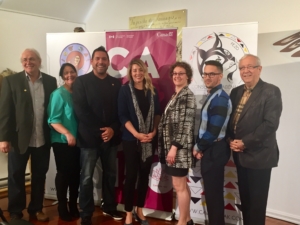
De gauche à droite: M. Mario Marchand, Mme Florence Benedict, M. Denys Bernard, Mme Mélanie Joly, Mme Anne Bishoff, M. Dave Bernard et M. Louis Plamondon
C’est à Wôlinak que l’honorable Mélanie Joly, ministre du Patrimoine canadien, a annoncé le 26 mai dernier le financement de deux nouveaux projets communautaires qui souligneront la richesse des cultures autochtones au Québec dans le cadre de Canada 150.
Le Conseil des Abénakis de Wôlinak a reçu près de 151 000$ pour son projet d’exposition intitulée « Mémoire vivante, la rivière au long détour » soulignant la place d’accueil et le lieu de mémoire de la mission Bécancour/Wôlinak. L’histoire des Abénakis sera, entre autres, mise en valeur par la réalisation de murales figuratives, d’une projection multimédia et d’une exposition d’artéfacts historiques tout au long de la saison estivale, et ce, dès le 21 juin prochain. « Avec l’exposition “Mémoire vivante, la rivière au long détour”, notre communauté retrouve sa place dans la grande histoire des Premières Nations ainsi qu’à Bécancour. » se réjouit M. Michel R. Bernard, chef du Conseil des Abénakis de Wôlinak.
Le Centre communautaire Saint-Pierre, quant à lui, a reçu un montant de 23 160$ pour l’aménagement d’un campement autochtone extérieur situé à proximité de ses installations, et ce, du 31 juillet au 3 août 2017, en collaboration avec le Conseil des Abénakis d’Odanak. En plus de faire connaître la culture autochtone et de favoriser un rapprochement culturel, ce projet initie les jeunes et les familles non autochtones à l’art et à la culture autochtones par la tenue de diverses activités. Comme le mentionne M. Gilbert Fafard, coordonnateur communautaire au Centre communautaire Saint-Pierre « Le campement autochtone extérieur que nous aménagerons en collaboration avec le Conseil des Abénakis d’Odanak permettra le rapprochement culturel entre les Autochtones et les non-Autochtones de la région de Drummondville et du Centre-du-Québec. En plus de favoriser une meilleure connaissance de notre passé et des mœurs des communautés autochtones du Québec, une telle activité nous donne l’occasion de mieux entrevoir notre avenir commun dans le Canada de demain. »
« Aucune relation ne compte plus aux yeux du gouvernement du Canada que celle qu’il entretient avec les peuples autochtones » souligne l’honorable Mélanie Joly, ministre du Patrimoine canadien, 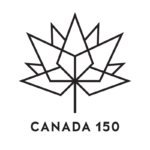 « C’est pourquoi nous sommes fiers d’appuyer ces deux nouveaux projets communautaires qui permettront aux Canadiens de découvrir toute la richesse et l’histoire des cultures autochtones. Profitons de Canada 150 pour resserrer les liens qui nous unissent afin de léguer un bel héritage aux générations à venir. »
« C’est pourquoi nous sommes fiers d’appuyer ces deux nouveaux projets communautaires qui permettront aux Canadiens de découvrir toute la richesse et l’histoire des cultures autochtones. Profitons de Canada 150 pour resserrer les liens qui nous unissent afin de léguer un bel héritage aux générations à venir. »
Il est important de rappeler que le gouvernement du Canada a accordé ces financements par l’entremise de Fonds Canada 150. Grâce à ce Fonds, le gouvernement appuie la tenue d’activités tant à l’échelle locale que nationale pour que les Canadiens d’un bout à l’autre du pays soient de la fête et ainsi faire de 2017 une année mémorable.
THE WABAN-AKI PILASKW – MAY EDITION IS NOW ONLINE
Hi everyone,
The last edition of the Waban-Aki Pilaskw newspaper is now available online. To take a look a it, CLICK HERE. Enjoy your reading!
RECOMMANDATIONS BY THE ODANAK HEALTH SERVICES – TAP WATER
IMPORTANT MESSAGE TO ALL RESIDENTS OF THE ODANAK COMMUNITY
Following the interruption of the aqueduct service on May 3 and 4, we recommend you maintain sufficient drinking water (around 2 cases of 24 bottles) in your home to meet your daily needs for a period of 24 to 48 hours in case of a similar occurrence.
Additionally, in the event of a boil water advisory (requirement to boil water at least 2 minutes prior to consumption) issued by Health Canada, it is important to follow the guidelines as failure to do so could lead to:
- Nausea/vomiting
- Diarrhea
- Abdominal discomfort
Most often, symptoms or discomfort may appear 12 to 72 hours following ingestion.
Remember to boil tap water for one minute (rolling boil) prior to the following uses:
- Drinking;
- Preparing infant formula, baby bottles and baby food;
- Preparing beverages such as juices, tea and coffee;
- Washing raw vegetables and fruit;
- Making ice;
- Brushing teeth and rinsing mouth.
Tap water may be used for personal hygiene, unless otherwise stated in the boil water advisory.
Tap water may be used for bathing or showering, but avoid swallowing. Toddlers and infants should be sponged bathed to reduce the likelihood of swallowing water and to ensure they do not suck on soaked clothing.
As soon as a boil water advisory is in effect, it is important to follow the recommendations until lifted by Health Canada.
In the event of a similar situation, we invite you to tune into the CKBN radio station (90.5 FM) and regularly consult the Facebook page of the Abenakis of Odanak Council to follow the latest developments. Additional notices will be sent through the community post office.
For additional questions, please do not hesitate to contact us.
Deny O’Bomsawin, Health Services Director
Andréanne Gouin, Community Health Liaison Officer
Partenariat avec Hydro-Québec : la visite d’une première école! (in French only)
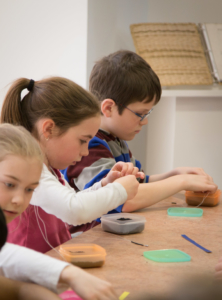 Il y a un an Hydro-Québec annonçait au Musée des Abénakis qu’il lui octroyait une commandite de 24 000 $ pour permettre à plus de 500 élèves provenant de milieux défavorisés d’avoir accès gratuitement à des activités culturelles enrichissantes. Par le biais du programme éducatif scolaire, les élèves de dix écoles des régions de la Mauricie et du Centre-du-Québec auront l’opportunité d’enrichir leurs connaissances et de consolider les acquis développés à l’école. Ce forfait, d’une durée de 3h, inclut le transport en autobus ainsi que la découverte active des modes de vie de la Première Nation des Abénakis en suivant le cycle des 13 lunes.
Il y a un an Hydro-Québec annonçait au Musée des Abénakis qu’il lui octroyait une commandite de 24 000 $ pour permettre à plus de 500 élèves provenant de milieux défavorisés d’avoir accès gratuitement à des activités culturelles enrichissantes. Par le biais du programme éducatif scolaire, les élèves de dix écoles des régions de la Mauricie et du Centre-du-Québec auront l’opportunité d’enrichir leurs connaissances et de consolider les acquis développés à l’école. Ce forfait, d’une durée de 3h, inclut le transport en autobus ainsi que la découverte active des modes de vie de la Première Nation des Abénakis en suivant le cycle des 13 lunes.
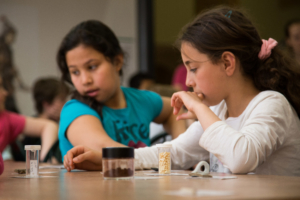 La première institution qui a bénéficié de ce partenariat culturel est l’école primaire Saint-Dominique, de Trois-Rivières. Jeudi, le 4 mai dernier, 60 élèves de 3e et 4e année sont venus vivre une rencontre culturelle captivante au Musée des Abénakis. Ces derniers ont entre autres eu la chance de visiter l’exposition permanente du Musée Wôbanaki : peuple du soleil levant qui met en valeur les modes de vie traditionnels et les savoir-faire ancestraux des Abénakis, de devenir apprenti archéologues d’un jour et d’identifier des artéfacts trouvés à Odanak puis de fabriquer un collier perlé; un souvenir avec lequel les élèves sont retournés, sourire aux lèvres, à la maison.
La première institution qui a bénéficié de ce partenariat culturel est l’école primaire Saint-Dominique, de Trois-Rivières. Jeudi, le 4 mai dernier, 60 élèves de 3e et 4e année sont venus vivre une rencontre culturelle captivante au Musée des Abénakis. Ces derniers ont entre autres eu la chance de visiter l’exposition permanente du Musée Wôbanaki : peuple du soleil levant qui met en valeur les modes de vie traditionnels et les savoir-faire ancestraux des Abénakis, de devenir apprenti archéologues d’un jour et d’identifier des artéfacts trouvés à Odanak puis de fabriquer un collier perlé; un souvenir avec lequel les élèves sont retournés, sourire aux lèvres, à la maison.
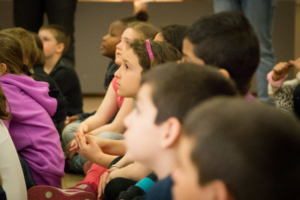 Le Musée des Abénakis
Le Musée des Abénakis
Depuis 1965, le Musée assure la promotion du développement culturel de la Première Nation des Abénakis et la conservation de ses traditions millénaires. Ayant accueilli plusieurs milliers de visiteurs depuis son ouverture, le Musée est un lieu dynamique de diffusion et d’animation éducative et culturelle.
Le Musée des Abénakis est subventionné par le ministère de la Culture et des Communications et le Conseil des Abénakis d’Odanak.
AVIS D’ÉBULLITION DE L’EAU – DIRECTIVES (in French only)
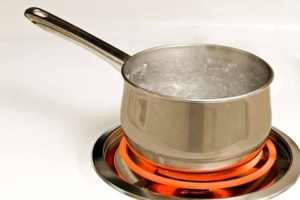 N’utilisez pas l’eau du robinet sans l’avoir fait bouillir à gros bouillons, pendant au moins une minute, ou utilisez de l’eau embouteillée.
N’utilisez pas l’eau du robinet sans l’avoir fait bouillir à gros bouillons, pendant au moins une minute, ou utilisez de l’eau embouteillée.
Un avis d’ébullition diffusé à titre préventif a été émis le 2 mai 2017 pour l’ensemble du réseau de distribution d’eau potable de la communauté d’Odanak.
CET AVIS EST MAINTENU EN VIGUEUR JUSQU’À NOUVEL ORDRE.
Nous vous invitons à partager le présent avis avec vos connaissances et voisins, notamment des personnes isolées ou dont la santé est précaire.
QUE DEVEZ-VOUS FAIRE?
Vous devez utiliser de l’eau du robinet qui a préalablement bouilli à gros bouillons pendant une minute, ou de l’eau embouteillée, pour tous les usages suivants, et ce, jusqu’à la diffusion d’un avis contraire :
- Boire et préparer des breuvages;
- Préparer les biberons et les aliments pour bébés;
- Laver et préparer des aliments mangés crus (fruits, légumes, etc.);
- Apprêter des aliments qui ne requièrent pas de cuisson prolongée (soupes en conserve, desserts, etc.);
- Fabriquer des glaçons;
- Se brosser les dents et se rincer la bouche;
- Abreuver les animaux de compagnie.
Jetez les glaçons (n’oubliez pas les réservoirs des réfrigérateurs), boissons et aliments préparés après le 2 mai 2017 avec l’eau du robinet non bouillie.
Vous pouvez utiliser directement l’eau du robinet pour :
- Préparer des aliments et des mets dont la cuisson exige une ébullition prolongée;
- Laver la vaisselle à l’eau chaude avec du détergent, en vous assurant de bien l’assécher;
- Faire fonctionner le lave-vaisselle, si celui-ci est réglé au cycle le plus chaud;
- Laver des vêtements et prendre une douche ou un bain. En ce qui concerne les jeunes enfants, assurez-vous qu’ils n’avalent pas d’eau durant le bain ou lavez-les avec une débarbouillette.
Si vous possédez un dispositif de traitement de l’eau à votre résidence, vous devez appliquer les mesures indiquées ci-dessus, à moins qu’il ne s’agisse d’un purificateur domestique conçu pour désinfecter l’eau. Les dispositifs tels les adoucisseurs sont généralement inefficaces pour éliminer les micro-organismes.
Écoles, entreprises, commerces et institutions desservis
- Avisez votre clientèle que l’eau est interdite à la consommation.
- Fermez les fontaines d’eau et affichez des avis près des autres robinets où de l’eau reste disponible.
Nous sommes désolés des inconvénients que cette situation peut occasionner et nous vous remercions de votre compréhension. Le Conseil des Abénakis d’Odanak prend actuellement toutes les mesures à sa disposition pour corriger ce problème.
Pour toute information, consultez notre page Facebook qui est mise à jour régulièrement.
